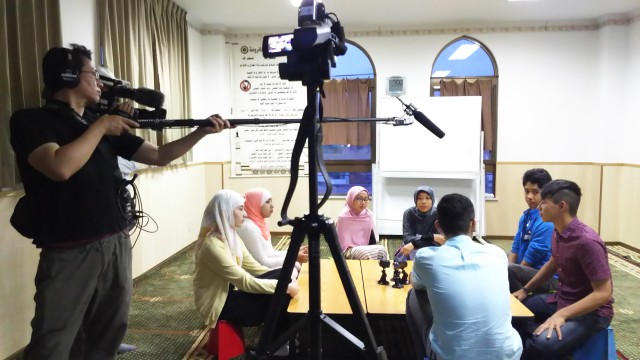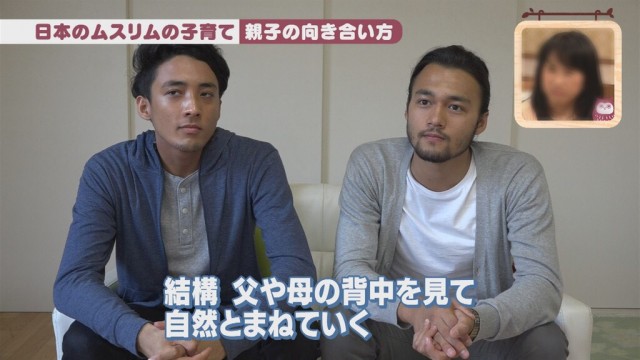Although the voice of researchers or adult Muslims talking about Islam or the life of Muslims in Japan is heard, it is rare to hear the voice of the (Muslim) children. In that context, featuring the feelings of high school students gathering in Masjid Nagoya in“Hot Evening” program produced by NHK Nagoya broadcasting office in November last year was an epoch-making event are(details about thathere).

Less than one year after that, the feelings of Muslim children were featured (again) in “The Meeting of Gossiping Guardians” Program prepared this time by E TV Station of NHK. Since the production director herself/ himself was both raising children and spending time learning about Islam, she/ he had neither least bias nor preconception and she/ he could perceive the condition of the children and sympathize with their feelings from the viewpoint of the mothers and kindly feature them in the program.(information about that broadcasting is here).
Although the video in the program was merely 4 minutes length, the actual length of the recording was 2 hours in which seven high school children jointly contributed many examples. Interested people can use the link here as a reference.
The overall summary of the program was posted on the homepage of “The Meeting of Gossiping Guardians” by E TV Station of NHK. After clicking the link here”.
The video which was transmitted within the program is transcribed below:
Narration: The persons talking about their distress (here) were high school students who are living in the suburbs of Nagoya. They are Muslim children who are attending Japanese schools. First, the problem that they were looked at as [they may change because they are related to the extremist organization IS].
Senior high school 2nd grade male student: because it is said “Islam state” at news, “IS” is thought to be (really) an Islam organization. And thus I am considered a fellow of them. When I am passing, persons who do not kindly understand keep calling me “terrorist” in a teasing way. I am surrounded by many persons who do such things.
Junior high school 3rd grade male student: Me too, when I was changing to gym suit for gymnastics class, one student tied the clothes he took off round his head like this…, then a different friend said [Waa, Islam, Islam] and they laughed with each other. It was very heart-breaking for me to watch that. I can understand saying “IS”, but saying Islam will link (that Islam) to the religion I believe in. I do not like the same word to be used.
Senior High school 1st grade female student: It is like, while Islam is not spreading, IS is unfortunately the one who spread. And IS became even more famous. Therefore, I terribly hate IS. Really hate it.
Narration: What promotes the prejudice is the SNS (social networking services). Abuses against Muslims are spreading rapidly.
Senior High school 1st grade female student: In Twitter and such, a person whom I even completely do not know wrote extremely insulting words when the matter of IS was raised, such as [Muslims! All Leave (Japan)], or [Do not come to Japan any more]. Most probably there are young people who wrote such things. I do not want to see such things, but sometimes it is retweeted and circulated, and it is a great shock to see that the retweeter is a friend of mine. That is very painful. I suffer from seeing information I do not like to see, and there is no way to cut that off.
Narration: Then the most troubling problem is that [It is hard to disclose that I am a Muslim to my friends].
Senior high school 2nd grade male student: Because Japan is now still not accustomed to Muslims, there are people who do not know anything about Muslims. No matter how good one’s friend is, just when one says that thing (one is a Muslim) the attitude of that friend would change or etc. Therefore, I can not say myself [as I am a Muslim] of a sudden, I am afraid after all. Also because I would be very severe to me if that friend says something like [It is impossible to (go along) with you].
Senior High school 1st grade female student: Sure enough to say it is unforgettable to be turn down, staying in one’s head and memories.
Senior high school 2nd grade male student: That to be linked to Islam feels like one is behind a very large barrier. I would like others to deal with Muslims usually because they are humans same as others.
In the second half of the program, there was a speech of university (Muslim) students;
Narration: He is a son who strayed from the right path. Yet, his mother kept taking care of him according to teachings of Islam as he says. This second son who became a 4th grade university student will (now) kindly make a retrospect of that time.
University 4th grade male student: Contrary to what may be expected, she (mother) didn’t leave me alone; rather she reservedly supported me from time to time. For example, she would sit and talk to me a little saying [I think it would be good if it is like this] or such a like. Because of her watching over me and support to me all times, I understood deeply in my heart, when I started to settle down, that after all there is somebody standing by me, or say I paid attention to that.
Narration: So the mother always took care of her son composedly without anger or whining, and solely kept saying her opinion tenaciously. This is following one of Islam teachings which say hold a firm perseverance towards everything. As for the son, he followed the opinion of the parents, which is another Islam’s teaching.
University 4th grade male student: For example, since appreciating the mother is quite an Islamic consideration, my father is dealing with his mother just like what is called in Japan “a mommy’s boy”. He does that naturally and in front of whomever, wherever and whenever he is. Therefore, and because our role models are our own parents, when we see how much our parents take care of their own parents, we look at our parents and imitate them after all, no matter how much our friends round us say bad words about their own parents.
Narration: It means that watching one’s parents appreciating their own parents naturally grew one’s respect towards one’s own parents. What about the third son who kept saying to his scarf-tying mother [don’t come to school].
University 1st grade male student: I think if she had decided to come against my will, I would have probably said [I don’t want to go school]. I am really grateful to her that she had not insisted to come. I believe it is by virtue of that, I came up to here now, managed to enter university, and doing well, and got along with myself.

Announcer: Also the sons said the following: Our mother always said [appreciate your father]. Upon asking them about what the father always used to say to his sons on the other hand they answered [appreciate your mother more than anything else].
The overall summary of the program was posted on the homepage of “The Meeting of Gossiping Guardians” by E TV Station of NHK. After clicking the link バックナンバー and scrolling down to the title 「ちゃんと知りたい!イスラム教徒ホゴシャーズ登場」 you can see it here.


